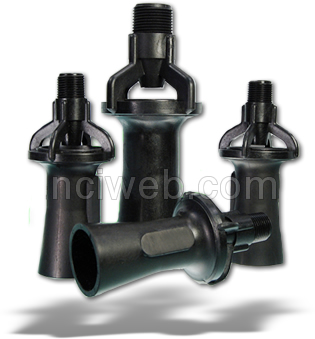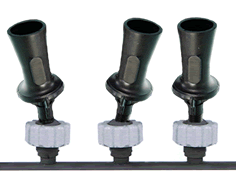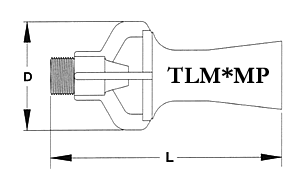Plastic Tank Nozzles (Eductors)
 Plastic Tank Nozzles are available in PPL (Glass Reinforced Polypropylene) and PVDF (KYNAR®). Eductor circulation ratio of supply to discharge is 1:5
Plastic Tank Nozzles are available in PPL (Glass Reinforced Polypropylene) and PVDF (KYNAR®). Eductor circulation ratio of supply to discharge is 1:5
Tank Nozzles are designed for "in-tank" applications. The TLM operates on the principle of flow dynamics pressurized fluid is accelerated through the nozzle to become a high velocity stream that entrains tank contents and intimately mixes with them. This combined stream exits the TLM at a high velocity creating a flow field capable of causing additional agitation and mixing the tank contents.
The Tank Nozzles' motive fluid may come from two sources. The tank liquid may be re-circulated through the eductor via an external pump or a secondary fluid may be introduced into the tank. Gases, as well as liquids, are used as the secondary fluid. Aeration and gas dispersion for chemical reactions are common uses of gas motive systems. Liquids are typically additives to be mixed with or to dilute the tank contents.
Available Materials / Properties
Easily build tabbed content areas anywhere on your page using jQuery tab panels like this:
Excellent resistance (no attack) to dilute and concentrated Acids, Alcohols, Bases and Mineral Oils
Good resistance (minor attack) to Aldehydes, Esters, Aliphatic Hydrocarbons, Ketones and Vegetable Oils
Limited resistance (moderate attack and suitable for short term use only) to Aromatic and Halogenated Hydrocarbons and Oxidizing Agents.
Quick Facts:
Maximum Temperature: 140°F
Minimum Temperature: 32°F
UV Resistance: Poor
Rigid
Specific Gravity: 0.90
KYNAR® (PVDF) is a high molecular weight thermoplastic polymer with excellent chemical inertness. It is highly resistant to oxidizing agents and halogens and is almost completely resistant to allphatic, aromatics, alcohols, acids and chlorinated solvents. It is resistant to most acids and bases. Mechanically strong. High dielectric strength. Thermally stable. Resistant to low temperatures. Stable to ultraviolet and extreme weather conditions. Self-extinguishing and non-toxic.
Quick Facts:
Maximum recommended temperature: 250° F
Thermal conductivity (ASTM C 177) : 1.32 Btu-inch/hr-ft~2- ° F
Specific heat : 0.23 Btu/lb- ° F
Coefficient of linear thermal expansion (ASTM D 696) : 7.1×10~5
Applicable temperature range for thermal expansion : 50-300° F
Mechanical Properties:
Specific gravity (ASTM D 792) : 1.78
Tensile strength, Ultimate (ASTM D 638) : 7,800 p.s.i.
Elongation at break (ASTM D 638) : 80%
Tensile modulus (ASTM D 638) : 3.5×10~5 p.s.i.
Rockwell hardness (ASTM D 785) : R100
Impact strength (73° F) (ASTM D 256) (notched) : 3.0 ft-lb/inch
Flexural strength (ASTM D 790) : 10,750 p.s.i.
Flexural modulus (ASTM D 790) : 3.3x 10~5 p.s.i.
Wear factor against steel 40 psi 50 fpm : 1000×10~10
Coefficient of friction 40 psi 50 fpm : 0.24 Dynamic
 Add the optional adapter and have the ability to adjust the direction of the spray pattern by simply twisting the cap, reposition the tank eductor and then re-tighten the cap. This option makes changing the flow pattern a snap. For sizes 1/4" and 3/8" only.
Add the optional adapter and have the ability to adjust the direction of the spray pattern by simply twisting the cap, reposition the tank eductor and then re-tighten the cap. This option makes changing the flow pattern a snap. For sizes 1/4" and 3/8" only.
Eductor Principles
Our eductors use a unique venturi design which enables smaller pumps to circulate large volumes of tank solution. The eductor will circulate four to five gallons of solution for each gallon pump through it.
Tank Eductor Specifications
It's as easy as copying and pasting to add collapsible jQuery accordion panels as shown below. The template includes all the code, you just need to position it where you want it and add your own content!

|
Model
|
PPL | KYNAR |
Pipe Size
|
Dim L
|
Dim D
|
|
TLM00MP
|
-PP | -KN |
1/4" NPT Male
|
3-1/8"
|
1-1/2"
|
|
TLM0MP
|
-PP | -KN |
3/8" NPT Male
|
4-1/2"
|
2-1/8"
|
|
TLM2MP
|
-PP | -KN |
3/4" NPT Male
|
6-3/8"
|
3"
|
|
TLM3MP
|
-PP | -KN |
1" NPT Male
|
8-1/2"
|
3-3/4"
|
|
TLM4MP
|
-PP | -KN |
1-1/2" NPT Male
|
9-7/8"
|
4-5/8"
|
| Nozzle Flow (GPM) At Various Pressures (psi) | |||||||||
|
Model
|
Maximum Free Passage
|
10 psi
|
15 psi
|
20 psi
|
25 psi
|
30 psi
|
35 psi
|
40 psi
|
50 psig
|
|
TLM00MP
|
0.188
|
3.2
|
3.9
|
4.5
|
5.0
|
5.5
|
5.9
|
6.3
|
7.1
|
|
TLM0MP
|
0.288
|
7.5
|
9.2
|
10.6
|
11.9
|
13.0
|
14.0
|
15.0
|
16.8
|
|
TLM2MP
|
0.386
|
13.5
|
16.5
|
19.1
|
21
|
23
|
25
|
27
|
30
|
|
TLM3MP
|
0.481
|
21
|
26
|
30
|
33
|
36
|
39
|
42
|
47
|
|
TLM4MP
|
0.612
|
33
|
40
|
47
|
52
|
57
|
62
|
66
|
74
|
Our tank eductors are used for mixing chemicals, suspending solids, adjusting pH, "sweeping" debris or sludge toward a filter intake and many other useful applications.
- Plating Tanks
- Cleaning Tanks
- Phosphating Tanks
- E-coat Tanks
- Fertilizer Tanks
- Plup Tanks
- Sludge Tanks
- Paint Booths
- Anodizing Tanks
- Cooling Towers
Maximize Performance
Computer optimized flow paths enable the model TLM to maintain a high "pick-up ratio" (the ratio of fluid entrained to the motive fluid) while maximizing the hydraulic efficiency (the ratio of hydraulic power at the outlet of the TLM to the hydraulic power at the inlet) to generate an optimum flow field from the greatest flow amplification.
